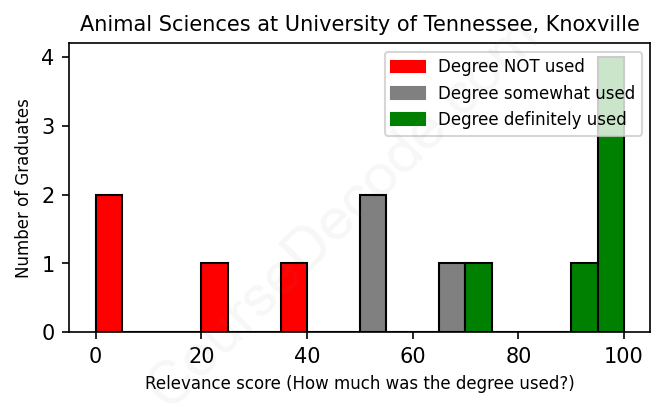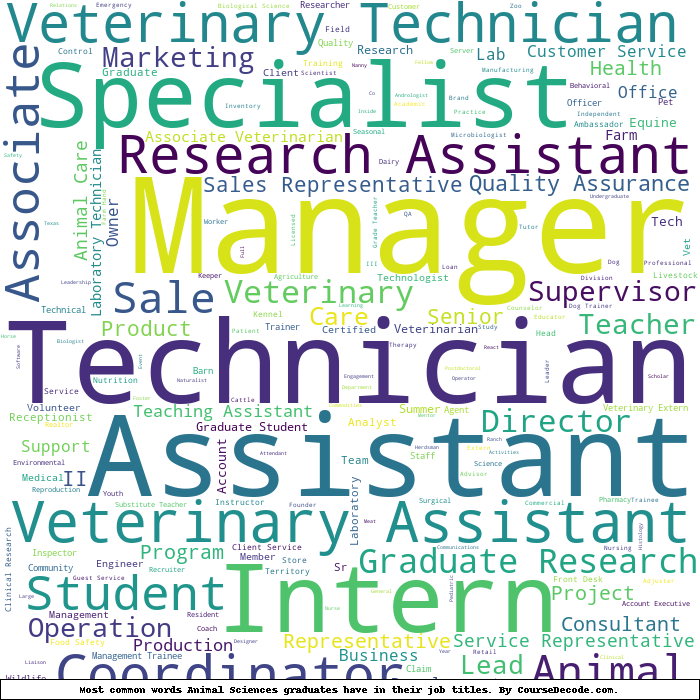
First, some facts. Of the Animal Sciences graduates from University of Tennessee, Knoxville we've analyzed , here's how many have used (or NOT used) their degree in their career:

These are estimates based on AI analysis of 13 LinkedIn profiles (see below).
The verdict? Below average. Overall, with an average relevance score of 61%, Animal Sciences graduates from University of Tennessee, Knoxville have a lower likelihood (-6%) of finding work in this field compared to the average graduate across all fields:
And for comparison, here's the chart for all profiles we've looked at across all degrees.
Also, after graduating, only 23% of these graduates have pursued further education other than another Bachelor's degree (such as a Masters degree or other), compared to the average across all profiles of 35%. This suggests a Bachelors degree is enough for most Animal Sciences graduates, and it's normal to look for work straight after graduation.
See the details:
|
Relevance score: 91% We think this person has gone into a career highly relevant to their degree. We think this person has gone into a career highly relevant to their degree.
DEGREE INFOGraduated in 2015 from University of Tennessee, Knoxville with a Bachelor of Science in Animal Sciences. No other secondary education since. JOB HISTORY SINCE GRADUATIONAnimal Trainer NATURAL ENCOUNTERS INC Mar 2017 - Aug 2017 Animal Keeper Trainee  The Walt Disney Company Jun 2016 - Dec 2016 Nutrition Assistant  The Walt Disney Company Jan 2016 - Aug 2017 Animal Keeper  The Walt Disney Company Aug 2017 - Present ABOUTNo information provided. |
The top 10 most common jobs done by the graduates we've analyzed (ranked most common to least) are:
After going through all these LinkedIn profiles, it’s pretty clear that many graduates with a degree in Animal Sciences from the University of Tennessee, Knoxville have landed jobs that are highly variable in terms of their relevance to their degree. One of the most common career paths seems to be working with animals directly, like in roles such as Animal Keepers, Veterinary Technicians, and Animal Care Interns. These jobs are definitely aligned with the skills and knowledge graduates gain during their coursework, focusing on areas like animal care, behavior, and husbandry practices. It's great to see some graduates thriving as Wildlife Biologists and Animal Trainers, which are also deeply rooted in the scientific principles learned during their studies.
However, there are also quite a number of folks who have ventured into fields that are pretty far removed from Animal Sciences. Many ended up in roles like Customer Service Representatives, Marketing Coordinators, and various teaching positions, which simply don’t utilize animal science know-how on a daily basis. It's a mix - while some are out there caring for animals and working in relevant settings, others are applying their skills in entirely different industries that don’t make the most of their backgrounds. So, while it seems like there’s a solid foundation for many graduates to work in animal-related fields, there's also a significant portion that has chosen paths that stray far from those roots. Overall, it’s a bit of a mixed bag!”
Here is a visual representation of the most common words in job titles for Animal Sciences graduates (this is across all Animal Sciences graduates we've analyzed, not just those who went to University of Tennessee, Knoxville):

When you look at the career paths of graduates from the University of Tennessee, Knoxville with degrees in Animal Sciences, you can see a mixture of success in animal-related fields and some shifts away from their original focus. For many, their first jobs out of college tend to be internships or entry-level positions in zoos or veterinary clinics, like animal care internships or veterinary technician roles. Some, like the graduates from 2015 and 2016, landed jobs as zookeepers and animal trainers, which strongly align with their studies. Others, however, seem to have veered off into positions that may not entirely revolve around animal sciences, including roles in education and corporate management, like the graduate who went on to become a Brand Operations Manager at Victoria's Secret.
Fast forward a few years, and while some graduates continue to climb the ladder in animal care and veterinary services—like becoming a Senior Staff Scientist at a lab—others find themselves in entirely different fields. It seems like the initial interest in Animal Sciences sometimes leads to diverse opportunities outside the traditional career paths. While there is definitely a solid foundation for many who stay in animal-related careers, some have taken unexpected turns and are thriving in unrelated industries. Overall, it's a mixed bag of people who start off strong in animal sciences but may end up in roles that don’t directly correlate with their degrees.
Getting a Bachelor’s degree in Animal Sciences at a place like the University of Tennessee, Knoxville can be pretty challenging, but it really depends on your interests and strengths. If you're passionate about animals and the science behind them, you'll likely find the material engaging, which can make it easier to tackle. The coursework includes everything from biology and genetics to nutrition and animal behavior, so it's definitely not a walk in the park; you’ll need to put in some serious effort. Overall, it’s about average in difficulty compared to other science degrees, but if you love what you're studying, it can feel more manageable. Just be ready for some late nights studying and hands-on lab work!
Most commonly, in the LinkedIn profiles we've looked at, it takes people 4 years to finish a Bachelor degree in Animal Sciences.
When looking at what these Animal Sciences grads from the University of Tennessee, Knoxville have been up to, it’s a mixed bag in terms of money. Some of them, like the recent 2020 graduates, landed jobs that might not start off very high on the pay scale—think kennel tech or customer service roles—before possibly moving up into more specialized positions like claims adjuster. On the other hand, those with some experience, especially in technical or managerial roles, like the 2011 grad working as a Genetic Technical Specialist or the 2017 grad moving up in the corporate world at Victoria's Secret, probably have decent salaries by now. Overall, while some seem to be doing just fine, others might still be grinding through entry-level pay. It's definitely a mix of hustle and opportunity!
Here is a visual representation of the most common words seen in the "about" section of LinkedIn profiles who have a Bachelor degree in Animal Sciences (this is across all Animal Sciences graduates we've analyzed, not just those who went to University of Tennessee, Knoxville). This may or may not be useful:

Here are all colleges offering a Bachelor degree in Animal Sciences (ordered by the average relevance score of their Animal Sciences graduates, best to worst) where we have analyzed at least 10 of their graduates:
| College | Score | Count |
|---|---|---|
 Purdue University Purdue University
|
80 | 14 |
 California State Polytechnic University-Pomona California State Polytechnic University-Pomona
|
78 | 13 |
 North Carolina State University North Carolina State University
|
77 | 18 |
 Iowa State University Iowa State University
|
75 | 25 |
 University of Missouri-Columbia University of Missouri-Columbia
|
75 | 12 |
 South Dakota State University South Dakota State University
|
73 | 10 |
 The Ohio State University The Ohio State University
|
71 | 21 |
 University of Florida University of Florida
|
68 | 15 |
 University of Vermont University of Vermont
|
68 | 12 |
 Michigan State University Michigan State University
|
67 | 20 |
 University of California, Davis University of California, Davis
|
66 | 27 |
 University of Illinois at Urbana-Champaign University of Illinois at Urbana-Champaign
|
63 | 16 |
 University of Tennessee, Knoxville University of Tennessee, Knoxville
|
61 | 13 |
 University of Arkansas University of Arkansas
|
60 | 10 |
 California Polytechnic State University-San Luis Obispo California Polytechnic State University-San Luis Obispo
|
59 | 22 |
 University of Wisconsin-River Falls University of Wisconsin-River Falls
|
58 | 10 |
 Texas A&M University Texas A&M University
|
54 | 34 |
 Penn State University Penn State University
|
53 | 14 |
 Texas Tech University Texas Tech University
|
51 | 12 |
 Kansas State University Kansas State University
|
51 | 22 |
 Oklahoma State University Oklahoma State University
|
43 | 16 |